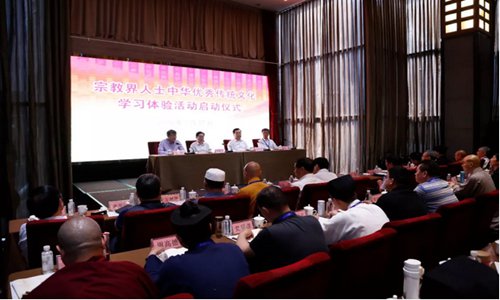China's religious leaders vow integration with Confucianism
China holds Confucianism studies for faith leaders

Around 100 representatives of China's major religious communities on Monday gathered in Confucius' birthplace to show their respect to traditional Chinese culture and vowed to better integrate religions with Chinese culture.
A five-day study and experience activity on traditional Chinese culture was launched in Qufu, Jining in East China's Shandong Province on Monday. The activity was held by the United Front Work Department of the Communist Party of China Central Committee, Tongzhan Xinyu, the department's WeChat account, reported on Monday.
During the event, participants will visit Confucius' temple, cemetery, family mansion, and the Confucius Institute in Qufu. Lessons, forums and seminars will be launched during the five days, the report said.
Wang Zuoan, director of the State Administration for Religious Affairs, attended the opening ceremony, together with heads from the national associations of five major religions in China - Buddhism, Taoism, Islam, Catholicism and Protestantism. The event is a salute of China's religious people to the excellent traditional Chinese culture, a common expression of their acknowledgment, and a pledge to integrate religion with Chinese culture, participants were quoted by the report as saying.
Yang Chaoming, head of the Confucius Institute, delivered a speech on Monday. He told the Global Times that Confucianism is a culture that focuses on harmony and tolerance and is also widely recognized by the religious representatives.
"Each religion has its own characteristics and is equal to others," Yang said. "They should be open to be compatible with society."
"In history, many exotic religions experienced encounters and conflicts, knowing and integrating with traditional Chinese culture after entering China," Yang said. "Only those that truly blend in could remain in the country."
For example, during the Ming Dynasty (1368-1644) and Qing Dynasty (1644-1911), Chinese Muslims used Confucianism to explain Islamic scriptures, which contributed to the deep integration of Islam into Chinese society, according to Tongzhan Xinyu.
Yang said three or four religious groups would visit the institute to learn about Confucianism each year.
On April 1, 94 religious personnel from Northwest China's Xinjiang Uyghur Autonomous Region visited the institute and experienced Confucianism, which "further enhanced their cultural confidence and the sense of national pride," according to the Shandong-based Confucius Institute's website.
"Confucianism is the essential thought in China and plays a core role in Chinese thought and cultural system," Jiang Haisheng, head of the Journalism and Communications Department at Shandong University of Political Science and Law, told the Global Times on Monday.
"Every exotic culture entering China should be localized… Enhancing the communication and fusion of different cultures and religions could create and enrich the modern Chinese wisdom," he said.
Newspaper headline: Religions vow culture integration